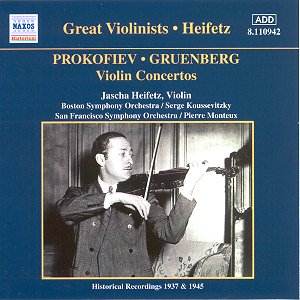Sergei PROKOFIEV (1891-1953)
Violin Concerto 2 in G Minor, Op 63
with Serge Koussevitsky; Boston SO (rec. 20/12/1937, Symphony Hall, Boston)
Louis GRUENBERG (1884-1964)
Violin Concerto, Op 47
 Jascha
HEIFETZ (1901-87)
Jascha
HEIFETZ (1901-87)
with Pierre Monteux; San Francisco SO
rec. 17/12/1945, War Memorial Opera House
 Naxos 8.110942
[62.12]
Naxos 8.110942
[62.12]
Crotchet
Amazon UK Amazon US

It's as though Heifetz said to his conductors when re-recording several concertos
in the late 1950s (with the Prokofiev it was Munch): 'Here's a challenge
Charles: let's beat my earlier recording time; prove I'm better than ever
I was. None of this losing it after fifty.' He did it in the Glazunov, and
in the Prokofiev, he clips his earlier time by 25 seconds, 15, and 18 in
the respective movements. All the conductors were different (though it's
the Boston in both Prokofievs, 22 years apart), and none, save Barbirolli,
were known as weightily slow or very brisk (like Stokowski, also speeding
up in old age and with whom Heifetz did not get on).
The Prokofiev Heifetz performance is stunning; and the Boston match with
wonderful, velvety yet alert, wind-studded accompaniment. The solos here
are nutty-flavoured and idiomatic. Remarkable sound for the period. Again,
Mark Obert-Thorn is responsible. The move towards fairly noiseless surfaces
has probably won out over the Pearl approach. Perhaps it was Michael Dutton,
once gaining squeals for his squeaky-clean approach, who tipped the balance.
Naxos's approach and choice of re-masterers reflects this. The film
noir-et-monochrome sound, as Tully Potter suggests, flatters the violin in
mono just as the acoustic recording flattered many singers who sounded less
good on electric. No matter; the later stereo remake is excellently fierce
and up-front, also recalling film tracks. Mono merely tames the excesses.
Lacking any recording of No. 1, the Prokofiev 2 is suitably coupled with
the Gruenberg. Naxos don't always manage this, but when they do - as in the
Elgar/Walton, it makes purchase mandatory. Gruenberg had great luck with
his soloists, but his work died out when they did. Hence his 1930s opera,
Emperor Jones, based on O'Neill's late 1920s experimental play, was
championed by Lawrence Tibbett to huge success. But after him, it faded entirely,
and unfairly. Written in three weeks in 1943, the concerto had a brief burst
of popularity before vanishing into a half-deserved obscurity. There are
few enough American string concertos in the repertoire, the Barber Violin
Concerto of 1940 obliterating the two fine ones of Walter Piston (1939, 1960,
recently acclaimed on the Naxos recording) or the later Bernstein
Symposium taken up by younger violinists. Gruenberg here would seem
to have emerged as a kind of Hollywood film-writer who got lucky with Heifetz.
Well, no. In fact, consulting my sub-Grove as it were, one finds Gruenberg
was part of the Russian-Jewish diaspora and although settling in America
at two, he studied in Berlin and Vienna, and with Busoni for piano no less.
He wrote only this one concerto and two violin sonatas and only smaller pieces
for his own instrument, and in fact his affinity for violinists is evinced
in this work.
The directions are English to a fault: 'Moderately' for the opening movement.
The rising figure which promises much delivers something. Through the first
movement we are subjected to tiny jazz and cowbell inflections, as if Copland
and Virgil Thomson's prairies are only a session away. Half-way though the
first movement a curious pre-echo of the happy heart theme of Korngold's
Violin Concerto finale emerges. Perhaps Gruenberg had been watching Korngold
films. One can only recall Korngold's riposte to Max Steiner's quip about
Korngold getting worse and Steiner better. 'That's easy, Steiner ... you
have been stealing from me and I have been stealing from you.' Gruenberg
too, perhaps. Touches of marimba at around 7:40 suggest this. Vienna, either
recalled or refracted through Korngold, figures highly in this concerto.
The second movement, despite its 'With simplicity and warmth' tag doesn't
really relax into lyricism. Despite Gruenberg's attempts at popularity, the
dark marimba opens flickering into a film-noire dream world, edged with nightmare
and harrowed magic. Again, the themes seem memorable for as long as they
last, but they lack the distinct cut of genius. Still, this movement edges
pretty near to permanently lodging. But long before the finale the movement
hits the high trail again at 4.40. It's quite unbelievable. It's as though
Gruenberg couldn't trust to his talent and lets us in for a banal hoe-down,
attractive enough in fact but by 6.22 when it calms down one is getting stereo
vision from mono. What Tully Potter has termed an attempt at a popular concerto
has in fact turned out a damaged confection of true impulse and lobba-de-lot-on,
an Americana pizza with candy. The finale 'Lively and with good humour' following
attacca isn't quite VE Day won by Ronald Reagan, but with a piano
honky-tonking cheek by jowl with Heifetz we seem somewhere off Auden's 52nd
Street (and that very different concerto/symphony of Bernstein's after Auden).
It's tuneful though, cheeking us with Gershwin near-quotes, as elsewhere.
One sequence has the horsy lumbering plains evoked by string players on the
bridge (soon overtaken by the piano's new glissandi) - a ghost ride. And
yes, there's whips, perhaps used with real point. Good humour? This was 1943.
The premature celebrations seem forced. The sound, apparently endemic for
all RCA/San Francisco recordings, has a suitable brashness, though its fierceness
has been well-tamed and Heifetz caught beautifully. Worth it for the Gruenberg
at this price, as well as the Prokofiev.
Simon Jenner
Listed Comparisons
Prokofiev - Violin Concerto 2 in G Minor, Op 63, with Charles Munch, Boston
SO. (rec. 1959) RCD1-7019
See also review by Rob
Barnett

